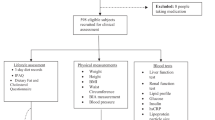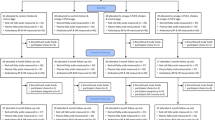Abstract
Objective: To examine the serum fatty acid and lipid profiles and dietary intake of Hong Kong Chinese omnivores and vegetarians with respect to cardiovascular health.
Design: Random population survey stratified by age and sex.
Subjects: One-hundred and ninety-four omnivore subjects (81 men, 113 women) age 25–70 y, and 60 ovo-lacto-vegetarian adults (15 men, 45 women) age 30–55 y.
Measurements: Nutrient quantitation was by a food frequency method. Serum fatty acids were analysed by gas chromatography, and serum lipid by standard laboratory methods.
Results: Compared with omnivores, vegetarians had higher serum concentrations of polyunsaturated (PUFA) and monosaturated fatty acids (MUFA), and lower saturated fatty acids (SFA), long chain omega-3 and trans fatty acids (TFA). They also had lower serum cholesterol and higher apoA-I concentrations, but the LDL/HDL ratio was not different. The ratio of polyunsaturated to saturated fatty acids intake was higher in vegetarians. Compared with results from populations with higher incidences of coronary heart disease, while lower myristic and palmitic acid concentrations and higher eicosapentaneoic (EPA) and docosahexanoic acid (DHA) may partly account for the difference in incidence, linoleic acid concentration was higher. Although the Chinese vegetarian diet may be beneficial for heart health in that antioxidant and fibre intakes are higher and saturated fat lower, the low EPA and DHA due to omission from dietary source and suppressed formation by high linoleic acid level, and the presence of TFA in the diet, may exert an opposite effect.
Conclusion: There are some favourable features in the serum fatty acid profile in the Hong Kong Chinese population with respect to cardiovascular health, but the consumption of TFA is of concern. The Chinese vegetarian diet also contains some adverse features.
Sponsorship: This study is partly sponsored by the Hong Kong Health Services Research Grant.
European Journal Of Clinical Nutrition (2000) 24, 768–773
This is a preview of subscription content, access via your institution
Access options
Subscribe to this journal
Receive 12 print issues and online access
$259.00 per year
only $21.58 per issue
Buy this article
- Purchase on Springer Link
- Instant access to full article PDF
Prices may be subject to local taxes which are calculated during checkout
Similar content being viewed by others
Author information
Authors and Affiliations
Corresponding author
Rights and permissions
About this article
Cite this article
Lee, H., Woo, J., Chen, Z. et al. Serum fatty acid, lipid profile and dietary intake of Hong Kong Chinese omnivores and vegetarians. Eur J Clin Nutr 54, 768–773 (2000). https://doi.org/10.1038/sj.ejcn.1601089
Published:
Issue Date:
DOI: https://doi.org/10.1038/sj.ejcn.1601089
Keywords
This article is cited by
-
The association of plant-based dietary pattern with general and abdominal obesity: a large cross-sectional study
Journal of Diabetes & Metabolic Disorders (2023)
-
Dietary acid load modifies the effects of ApoA2–265 T > C polymorphism on lipid profile and serum leptin and ghrelin levels among type 2 diabetic patients
BMC Endocrine Disorders (2022)
-
Comparison of dimension reduction methods on fatty acids food source study
Scientific Reports (2021)
-
Serum trans-fatty acids level are positively associated with lower food security among american adults
Nutrition & Diabetes (2018)
-
Plasma n-3 and n-6 fatty acids and inflammatory markers in Chinese vegetarians
Lipids in Health and Disease (2014)



